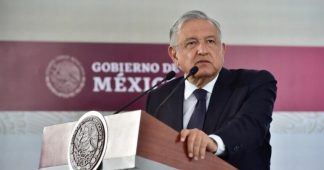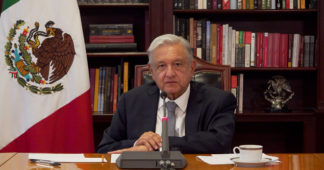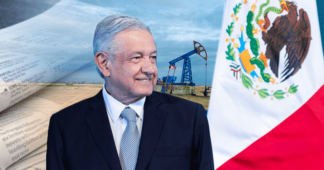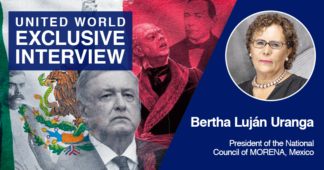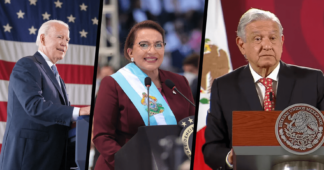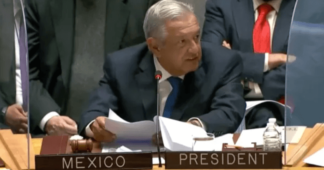After the overwhelming election victory of the first woman to head the government the course has been set for the future.
by Leo Gabriel *
“Como México no hay dos” (Like Mexico, there is no other) is a much-used saying that is often heard when foreigners, faced with apparent and real contradictions, realize that this country is a very special one. André Breton discovered in it the cradle of surrealism, whose roots he saw in a “double identity” between Indian stoicism and neo-colonial leadership cult, between ritual submissiveness and a macho-like arrogance.
This duplicity, which runs through the whole of Mexican history, also appeared recently when it came to evaluate the six years in office of a president who had claimed that he would overcome both neoliberalism and the corruption and violence that had held the country hostage since the Mexican Revolution (1914 to 1918), with a few exceptions.
From 1929 to 2000, Mexico was ruled by the so-called Partido Revolucionario Institucional (PRI), headed for six years by an almost omnipotent “Señor Presidente”. The assessments of the most renowned political scientists fluctuated between “temporary dictatorship” and authoritarian presidential democracy. This model was unique in the whole world and was not compatible with either Western-style capitalism nor with the countries of the so-called “Realsozialismus (real socialism) in Eastern Europe. It reached a dead end in 2000, when Vicente Fox, a former CEO of Coca Cola from the arch-conservative Partido de Acción Nacional (PAN), won the presidential elections.
With him, neoliberal politics that had already been introduced by the previous PRI governments of Miguel de la Madrid and Carlos Salinas de Gortari got at its peak. His successor Felipe Calderón (2006 to 2012) from the extreme Right even went so far as to wage a “War on Drugs” in cooperation with the boss of the most powerful Sinaloa cartel, “Chapo” Guzman, who has since been sentenced to life imprisonment in the USA.
Obrador’s long march through the party landscape
It was at this time that the political star of the former governor of Tabasco, Andrés Manuel López Obrador (popularly known as AMLO), was rising. Together with many other politicians who were fed up with the corruption and increasing violence in the country he founded the Partido de la Revolución Democrática (PRD). The popularity of the PRD and AMLO soon became so great that Lopez Obrador took over the regency of Mexico City in 2000 and would almost have been elected President of Mexico six years later if he had not been displaced by a massive electoral fraud.
After months of fierce resistance, AMLO had to realize that with the PRD, which soon merged with the PRI and the PAN, was no longer a viable option. He therefore founded his own electoral party, the Movimiento de Regeneración Nacional (MORENA, which means “the dark-skinned one”), which millions of people joined within a very short time. But finally, due to his stubbornness, which led him to visit hundreds of communities in the interior of the country every year, he managed to be elected president on July 1, 2018 with 53.2 percent of the votes cast.
Now 70 years old, the thoroughbred politician, whose six-year term as president ends on 1st October this year, created his own monument during his lifetime, by classifying his term of office as the “Fourth Transformation” in Mexican history after independence from Spain in 1815, the victory of the liberals under Benito Juárez, and the Mexican Revolution.
But what remains of the grandiose promises of the man who set out to conquer the Mexican and Mexican-based foreign elites of big business?
The election day on June 2nd, 2024, on which not only the presidency, the deputies of the National Assembly and the Senate, but also the majority of governors and mayors were elected, provided ample opportunity to answer this question.
The writer of these lines, who lived in Mexico in the 1970s and part of the 1990s was primarily interested in bringing together people from as many different political, social and cultural milieus as possible and is less concerned with to establish whether the people addressed are actually right or wrong.
Convergences and discrepancies on election day
First of all, it should be noted that the 35 million votes collected (approx. 60 percent) that were cast in favor of the MORENA candidate Claudia Sheinbaum were not so much for herself, but for the President still in office. The same applies, mutatis mutandis, for the opposition parties PRI, PAN and PRD, who unified shortly after their electoral defeat in 2018 to form an electoral alliance called PRIAN.
However, their candidate Xóchitl Gálvez was unable to achieve more than 28%. Wherever you meet people in the queues outside their polling stations were asked why they had voted, AMLO appeared: either as the king of gods or as the bogeyman.
Yet the personality of Claudia Sheinbaum, who, like AMLO, was most recently mayor of the Mexican capital, could not have been more different in terms of her career, her character and her appearance. In contrast to AMLO, who is known for his populist demeanor which the opposition qualifies as a megalomania of a “left-wing caudillo”, Sheinbaum is a rather cool-looking woman who has not played a major role in Mexican domestic and foreign policy.
The fact that Sheinbaum, who has a degree in natural sciences with a focus on ecology and energy management has no roots in a past dominated by the PRI and PRD works to her advantage.
Because what was strongly criticized about AMLO by the MORENA base, among others, was the fact that during his term in office as president he increasingly surrounded himself with former PRI and PAN politicians who had mostly switched sides for opportunistic reasons. Although this approach led to a “win-win situation” in purely electoral terms, this behavior stands in opposition to the moralistic image of a modern missionary that López Obrador presents every morning in television during the so-called mañaneras.
What everyone gives the outgoing president credit for, however, is his decision to subordinate himself to the constitutionally enshrined principle of “no reelección” (no re-election) and not, like other former presidents of the left such as Nicolas Maduro in Venezuela, Evo Morales in Bolivia and Daniel Ortega in Nicaragua, who have attempted to overturn this principle, deeply rooted in Latin America’s history.
AMLO’s unholy alliance with the army
Another point of criticism that AMLO had to contend with within the party was his unholy alliance with the Mexican army, with which he formed a newly founded Guardia Nacional immediately after taking office. In the meantime, however, the army has become his privileged instrument in the implementation of four megaprojects. These projects include the ecologically and anthropologically questionable “Tren Maya” (Mayan Train), which is intended to turn the south of the country into a large-scale tourist region. But also, in the construction of a “dry channel” (equipped with high-speed container trains running across Mexico from the Pacific to the Atlantic, in competition with the US dominated Panama Canal) soldiers are being used as cheap labor.
“The question is who controls whom: the president the army or the army the president?” said a representative of the so-called Movimento Ciudadano, a civic movement that ran in coalition with MORENA in the 2018 elections and this time achieved considerable success separately from AMLO with ten percent of the votes cast.
López Obrador’s alliance with the army has also become the Achilles heel of his domestic policy. This is because most Mexicans consider this alliance as the real reason why AMLO has not been able to keep his promise, to reform the Mexican judiciary system after decades of corruption and complete disarray. The population, regardless of their party and religious affiliation, had expected the government to defeat organized crime and bring its political backers behind bars for life. In reality, however crime rate has hardly fallen, with the exception of the capital, and in the states in the north due to the sealing off of migrants on the orders of the US government. It has risen sharply. The massacre of 43 students at the teacher training academy in Ayotzinapa, Guerrero, according to a journalistic research, was carried out by the army in collaboration with criminal gangs.
In fact, the problem of personal security is perhaps the most difficult legacy that AMLO leaves to his successor. Thousands of migrants (especially women) are still being abducted, raped, tortured and made to disappear by the gangs, without the Guardia Nacional and/or the courts doing anything about it.
So why this collaboration with the Mexican army? Why are the drug cartels continuing to spread without the perpetrators being brought to justice? Why corrupt politicians, prosecutors and judges never appear in the dock?
There are completely different opinions on this subject. Members of the opposition believe that the MORENA officials themselves are already infected by the corruption virus. However, they are in the minority, as the elections have shown, in which their candidate Xóchitl Gálvez did not even win half as many votes as Sheinbaum. But there are also two different opinions within MORENA. While some believe that AMLO has not paid enough attention to the problem, his followers believe that the president himself would have fallen victim to an assassination attempt, if he stood up to the well-armed units of organized crime – just like the 30 or so candidates from various parties who were murdered during the election campaign on the orders of organized crime.
And then there are those who claim that AMLO had to agree to this alliance with the army under pressure from the US government, because for them it was the only guarantee that no more illegal migrants would come to the USA. “What a beautiful wall!” Donald Trump once said cynically referring to the Mexican army collaborating with the organized crime.
For this reason, the new president, who will take office on October 1st this year announced that she would work with AMLO to fundamentally reform the judicial system together with AMLO. This would require a constitutional reform, for which she now most probably has the necessary qualified majority in the Senate and the National Assembly (according to the official election results announced by the Instituto Nacional Electoral INE).
Reluctant solidarity in a hostile geopolitical environment
All these ambiguities, which, as mentioned at the beginning (see also Octavio Paz: “Laberinto de la Soledad” – ‘Labyrinth of Solitude’) characterize the cultural environment of Mexican politics are also reflected in Mexican foreign policy. The principle, which Claudia Sheinbaum also quoted repeatedly before and after her election, is “non-interference in the internal affairs of other countries”, a principle that was already found in the liberal reformer Benito Juárez (1806 to 1872). This was and still is the guiding phrase: “El respeto al derecho ajeno es la Paz” (Peace is the respect for the right of others” is a much-quoted saying of his, which can be seen hanging above the building of the famous National Museum of Anthropology.
These principles of Mexican foreign policy primarily serve to protect the country from any encroachments by the USA. as the rising superpower had seized a third of Mexico’s territory in the second half of the 19th century had annexed a third of Mexico’s territory. However, the question of how the Mexican government should behave if there are massive violations of human rights and international law by other States. This was and is the case, for example, with the current genocide in the Gaza Strip. In these cases, the government of López Obrador had initially retreated to a mediating position, although the overwhelming majority of the Mexican population is clearly on the side of the Palestinians. Only months after the Public Prosecutor’s Office of the International Court in The Hague decided to uphold the charges brought by South Africa, the Mexican Foreign Ministry was prepared to join this charge shortly before the elections.
In conclusion, it can be said that the Mexican government is pursuing a cautiously solidary foreign policy, particularly with regard to Latin America and the Caribbean. It supports Cuba, for example, a country that is currently in a desperate situation, with massive supplies of oil and medicine, as Miguel Diaz, the Mexican ambassador in Havana, reported,
How sustainable the left-liberal triumvirate of Lula da Silva (Brazil), Gustavo Petro (Colombia) and now Claudia Sheinbaum (Mexico) will prevail despite the expected resistance from the USA only time will tell.
The saying that every Mexican knows by heart also fits in with this: “Poor Mexico: so far from God and so close to the USA”.
* Dr. Leo Gabriel, born on 27 July 1945, is a journalist, documentary filmmaker and social anthropologist; co-founder of the World Social Forum, whose International Council he still belongs to today as coordinator of the International Peace Movements; he lived and worked in Latin America from 1970 to 1996, based in Mexico and Managua.
We remind our readers that publication of articles on our site does not mean that we agree with what is written. Our policy is to publish anything which we consider of interest, so as to assist our readers in forming their opinions. Sometimes we even publish articles with which we totally disagree, since we believe it is important for our readers to be informed on as wide a spectrum of views as possible.
